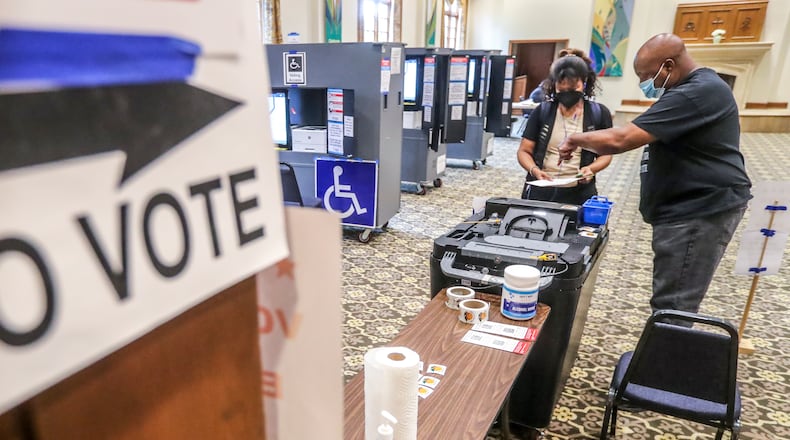An earlier presidential primary date won’t just bring a wave of political advertising and more attention to Georgia. It could also bring a surge of spending that generates thousands of new jobs and a nine-figure economic impact.
Those findings are outlined in a new economic analysis by Thomas More Smith, an Emory University finance professor who drafted an 11-page report on the effort by Democrats to make Georgia the fourth state to vote in next year’s presidential primary.
“There’s a reason why so many states want to be in the first handful of primary votes. Otherwise, they wouldn’t be fighting for it so hard,” Smith said. “There’s a sizable financial benefit.”
His analysis modeled a 2024 race that projects nearly a dozen contenders on the GOP ballot and a sleepy contest for the Democratic nomination, as President Joe Biden is expected to run for a second term with no serious primary opposition.
Moving Georgia up in the schedule could generate an economic impact of roughly $220 million in spending from campaigns, national parties and outside groups in the months leading up to the race, according to the analysis. It would also contribute to 2,200 new jobs.
The spending would soar higher in future elections that feature competitive primaries on both sides of the party line. Under Smith’s analysis, a wide-open 2028 contest could boast an economic impact as high as $375 million while adding more than 4,000 jobs.
The report is certain to be amplified by state and national Democrats who so far have unsuccessfully lobbied Georgia Republicans to embrace the scheduling overhaul. Democrats have until a June 3 deadline to negotiate the change.
No ‘downside?’
They face an uphill battle. Although national Democrats voted earlier this month to make Georgia the fourth state in the 2024 presidential nominating calendar, there are still significant hurdles to win approval for the move.
Georgia law gives Secretary of State Brad Raffensperger the sole authority to set the primary date, and he opposes any shifts that require two separate presidential primaries or risk the state’s delegates to either party’s convention.
Since national Republicans have already agreed to their lineup without Georgia near the start, jumping the ranks would cost the state GOP delegates.
Credit: TNS
Credit: TNS
While he hasn’t ruled out a change for next year, Raffensperger told The Atlanta Journal-Constitution he favors an early primary in 2028.
So far, Gov. Brian Kemp and top Republicans have steered clear of the idea. Some critics are wary of appearing as if Democrats strong-armed them into the move. Other critics worry about energizing Democrats, who flipped the state in the 2020 presidential race for the first time in nearly three decades.
Still, some GOP figures have lined up behind the switch. Cory Ruth, a Republican consultant, said he see’s no downside for the scheduling overhaul.
“I recognize the impact that South Carolina’s earlier spot has had,” Ruth said of that state’s first-in-the-South tradition. “It’s not a coincidence that many politicians in that state enjoy national prominence. This is an ideal time for us to assert our political identity.”
Smith’s analysis doesn’t project the impact of spending by media outlets covering the races, nor does it account for the economic impact generated by the coverage. It also doesn’t factor how Georgia’s earlier spot could attract additional federal spending down the line.
Instead, it distilled Federal Elections Commission data to focus on expenditures from the campaigns, the political parties and outside organizations such as super PACs in past primary cycles.
That spending adds up fast, said Markee Tate, president of Advancing Black Businesses, the public policy arm of the Atlanta Black Chambers.
“It would be a major economic impact for the state, particularly for Black business owners,” he said. “Restaurant owners, caterers, marketing firms, street vendors, hoteliers – there are so many businesses that could get the downstream effects of an earlier primary.”
Read the report:
About the Author
The Latest
Featured





